I am very grateful and honoured to be amongst all of you today. Thank you for giving me this opportunity to share with you some of my thoughts. I was asked to speak from the book which I have written entitled ‘The Journey Home’. There are various perspectives in which I can share my thoughts today. Today I would like to focus on the challenges that I confronted in my life that caused me to question the very fibre of everything I was taught was true.
Radhanath Swami shares memories of his childhood and youth
When I was about seven years old I was confronted with parents of my best friends who I was told hated me because of my minority religion. In fact I was told even God hated me. When you are that small and such words are coming from people your parent’s age, it really has an impact.
I was confused. Why is there so much hate in the name of a loving God? Is religion meant to bring about unity and love, or is it meant to divide us and create hate? – Radhanath Swami
I couldn’t intellectually reason it very well. I was just hurt and confused. As I grew a little older, my father went through bankruptcy. So when I was about 15, I had to get a job. And where I worked, everyone except my friend Gary and one other were African Americans from the ghettos of Chicago. This was in the mid-nineteen-sixties. They were my parents age or older, and I saw how beaten down they were by poverty and racial discrimination. There were no real equal rights. In the nineteen sixties if you were born African American in the ghetto, it was ninety nine percent for sure you would live and die in the ghettos. There were practically no opportunities, either in the North or the South. That every day it was the law of the country, in school before the class begins we would pledge allegiance to our flag. And the last line was, “I pledge the allegiance to the flag of the United States of America, and to the Republic for which it stands, one Nation under God, indivisible, with liberty and justice for all.” And as a fifteen or sixteen year old boy, when I would say, “Freedom and justice for all, men are created equal,” I would think about the people whom I worked with; I loved them, they were my friends.
Every one of them was an alcoholic or a drug addict, not because they were bad people, but because that’s the way they learned to cope with frustrations that were beyond themselves, the frustration of being hated. And I was being taught that this was the greatest country of the world, because there was liberty for all – providing you are a certain colour and a certain religion!! This did not make sense to me. – Radhanath Swami
In the nineteen sixties it was a turbulent time in the United States of America. There was war between two generations, the young generation and the old generation. Millions of people in their teens and early twenties formed a counter culture. They were protesting against an establishment of the older generation that they felt was hypocritical, because those were the people at that age that were subjected to the Draft. At that time the military, if they called you for the army – once you turn eighteen, you are eligible for the army – if they call, you have three choices. Go to the Vietnam War and fight a war and kill or be killed for a cause you absolutely don’t believe in; or go to jail and never be able to go to a proper college or get a good job for the rest of your life; or escape from the country and go to a foreign land probably never being allowed to come home. At that time those were the three choices we had and I was soon to become eighteen. There were millions of boys who were being drafted by force. And I had friends who were drafted; some were killed, some came back invalids and others were so traumatised they were drug addicts. It was a difficult time. Should I fight for something I really believe is wrong? So I joined the Civil Rights Movement with the followers of Dr Martin Luther King and I protested against segregation due to the colour of the skin and discrimination. I was in one march; I was the only white person; it was in the South, in Florida. And other white people who were standing on the sides of the roads were cursing me and throwing stones on me.
I had serious questions: “Where do I belong?” I heard Martin Luther King say: “If you don’t have an ideal you are willing to die for, you have nothing meaningful to live for.” I wanted to find that ideal. But for me, it wasn’t possible just floating along with the current of what everyone was doing, with the fashions and the fads, with the economic promises. – Radhanath Swami
In 1968 there was a Democratic Convention in Chicago at the Grand Park and young people went to protest there against the Vietnam War. I just went there to figure out what’s going on. I was tear-gassed and chased by police who were brutally beating people with clubs and arresting them and putting them in prison just for questioning in a free country.
You see, my search was not out of curiosity; it was a sense of identity, a sense of where I could find dignity in my life. In that sense, it was desperation. – Radhanath Swami
Radhanath Swami narrates the beginning of his journey
One day I was in New York City visiting a friend, and I got a call from a person I grew up with from about nine or ten years old. His name is Gary. He is my best friend. He was in New Jersey at a common friend’s house. He said, “Please come here. I have to talk to you.” I had no money in those days; so I hitchhiked. You know hitchhiking in India? You go like this, and someone picks you up. If no one picks you up, you stand like this, and usually someone would pick me up.
In those days, being a part of the counter culture I grew my hair long. Growing hair long was not a fashion in those days; it was a statement, a statement of revolution against established hypocrisy – and people hated people with long hair. So I stood on the road and I got to New Jersey. And my friend said, “Frank, our friend wants us to go to Europe with him. He is willing to pay for both of us if we go.” That was a convincing argument. So I was on a little airplane to Iceland with my friends and then to Luxemburg. And in Luxemburg we found out what type of facilities our friend Frank was going to give us! The first night we spent in a tent, and then we found out that there was a waterfall nearby – a small one. It was for the first time I was out of my country in which I was born; I just felt so free; I could do anything, go anywhere. When we came back from bathing under the waterfall, all of Frank’s money had been stolen; he left it in the tent. So he went back to America the same day. Gary and I were left with nothing; but we wanted to continue on this journey.
And as I was travelling I was going to museums and trying to get some messages of life from art; I was going to forests and river banks trying to get some messages of direction in life from nature and music. – Radhanath Swami
Music was a very important part of our lives back in the 1960s. The musicians were the heroes and the prophets, and somehow or the other Gary and I were hitchhiking. We went across the English Channel; police harassed us for about six hours with threats and abuse because our hairs were long – the immigration police. And finally they let us in. We stood at the side of the road, at the side like this, grateful that we were allowed in the country of UK. And our ride was going to an island, the Isle of White, where there was the biggest rock festival of the whole generation of the sixties. There were over five hundred thousand people over there, listening to the most popular successful bands. They didn’t play ragas; they played rock and roll. I was nineteen years old at the time. And I remember I was there, and the music was so loud. They didn’t have speakers everywhere, but they had speakers on the stage. And they had to be loud enough to really shatter the ears of five hundred thousand people, because that’s what people liked in those days. And we would go right up front and I was trying to be a part of the scene.
There was a silent calling that was from my heart that was actually louder than all the music, and it seemed to be calling me away from all of this. I didn’t know where, but I understood it was something spiritual, and I was being called to find in my life.
A few days after that rock festival, one of the great legends of the generation died of an overdose of drugs in England. Three days before I was sitting there watching him at the festival; his name was Jimmy Hendrix. He was talented, incredible wealth, incredible fame, he had every type of sensual pleasure he could possibly want. Everything that everyone in this world is striving for, he had it to enormous dimensions. But yet, was he happy? If he was, why did he die with an overdose of drugs? I said a prayer for him. I remember I was sleeping on the floor of someone’s house when they told me the news. But I remember thinking – what really is happiness? He had everything except happiness. – Radhanath Swami
I started going to monasteries – catholic monasteries, Franciscan monasteries, synagogues – spending more time in the forests, going to big cathedrals and spending days just praying and reading different philosophical and spiritual books. We travelled through France, through Italy, and eventually my thirst for spirituality became so much.
A call from the heart
I found that the very things that all my comrades in the counter culture were rebelling against, we were the same. We just had a different dress and we created a different language, but the same type of egoism and selfishness and greed was within us. I heard Gandhi’s words, “We should be the change that we want to see in the world.” I understood personally that, that change has to happen within ourselves. If we are not part of a solution we are part of a problem. So my conclusion was that that change has to be spiritual. – Radhanath Swami
And eventually, Gary and I were living in a cave in the Isle of Crete which is south of Greece. It is really a beautiful place; quite simple. But if I had to classify it, it was a five star cave, in the sense it was clean, and it had good ventilation. But it was just a cave; there was no furniture. We just slept on the stone ground. Every day I would climb a mountain and there on the top I would meditate, read holy books and pray for direction. I believed in one God.
I struggled – is religion bad or good? It seemed to be dividing people with so much hatred and so much prejudice. And everyone had absolute reasons to hate in the name of God. So if I want to find peace and be an instrument of peace, should I reject religion? It seemed like a good idea, but there was this inherent faith in the goodness of God and the goodness and the essence of all religions. And I was determined to find that essence, once connecting with which we can understand the real purpose and truth of all the spiritual paths of the world. – Radhanath Swami
I was praying for direction, and it became so intense when I was obsessed with finding my direction in life. I (had) told my parents that I will be back in two and a half months, and almost three months passed. There was no phone or post office in my cave. So I had no way to communicate with my parents, and I had no desire to do so because I knew it would break their hearts if I told them. I just couldn’t go home and continue college. There was a calling that i had to answer. So I would cry for direction.
One night as the sun was setting I heard a voice. It was the loudest voice I ever heard, but it didn’t have any sound. It was from within me; spoke three words, and I knew if I followed these three words, nothing would ever be same in my life. I would have to leave almost everything I thought I was behind, but I really believed that it was the call of God, and I still do. Would you like to know what those three words were? “Go to India.” Now, this was in 1970. I had never met an Indian in my life. I had never eaten Indian food in my life. I had never tasted a chilli pepper. I didn’t know where India was. I didn’t have a map. And I didn’t have a single penny or money to buy a map. But I was determined to go to India. I felt this is where my calling was taking me. It was perhaps the greatest challenge that I was ever confronted with. Am I willing to do this? – Radhanath Swami
So I climbed back down the mountain and went into the cave. My beloved friend Gary was sitting with long beard and long hair. He was in meditation. There was a little candle next to him. I meditated in another little part of the cave. As we were looking out, the sun had already set, the moon was rising, and the stars were in the sky over the Mediterranean Sea. I said to Gary, “Something incredible happened to me tonight.”
Garry said, “Something amazing happened to me.”
I said, “What happened?”
And he said, “You won’t believe me.”
“I will believe you. Just tell me what happened.”
“No. You won’t believe me.”
“I believe you. Tell. What happened?”
“At sunset, while I was on the ocean side, on the sand, I heard a voice.”
“What did it say?”
“You won’t believe.”
“You just tell me. What did it say?”
“Go to Israel.”
“Where?”
“I told you, you wouldn’t believe me.”
“Where? I just didn’t hear.”
“Israel. We should both go to Israel. God is calling us to Israel.”
“Gary! He told me to go to India!”
He said, “India?!”
It was total silence – because it was so shocking – for about twenty minutes. We were just looking up into the stars. I was crying, because I felt so grateful. I whispered into the sky, “I am ready to come.” Then I said, “Gary! I am leaving at sunrise tomorrow for India.” And he was really disturbed. He said, “Are you going to leave me all alone in this cave? Are you insane? Hitchhiking through Europe is one thing, but the Middle East… through the deserts! You will be killed. You can’t do that.” I said, “Gary, I believe that God has called me there.”
Radhanath Swami narrates his experiences of the Middle East
The next morning at sunrise I left him and started my journey to India. So many ways of hitchhiking! I hitchhiked like… working on a little fishing boat to get back to Athens. And then I started hitchhiking; I met a couple of people who also wanted to go to India, and we started going east. I believed that if I just keep on going in the eastern direction that someday I will reach India. I went through Turkey, Iran, Afghanistan, Pakistan. It took six months from the time I left London to the time I reached the boarder of India. The three months that I was travelling through the Middle East, usually alone, I was getting all kinds of diseases because of the way I was living. But I was really meeting some of the most beautiful people and some of the most dangerous people I ever met in my life, because when you are not a tourist and you are travelling, you are really completely dependent on a mercy beyond your own powers. And that was a nice thing for me; I think I aged about thirty years in those three months.
The one situation I’ll never forget. It really caused me to question again the very fibre of what we consider really valuable. In Kandahar, Afghanistan. In those days the people of Afghanistan were the friendliest, charitable, the most hospitable people I had ever met. They would take me in their homes and give me food, simple flat bread, and they were just so kind. Somebody took me to a tea stall; the place was really in poverty. The tea stall was just a tiny shack where about six people could sit on the floor, and we were crouched down on our feet and we each had little tiny cups of tea. No milk, just tea and a lump of little sugar within, dissolving. As we were sitting together… there were about five of us, very old Afghani men with turbans and their traditional clothes, very poor economically. At that time it was night, it was dark, just a little lantern giving some light. A boy, he was probably about fifteen or sixteen years old, he came in. He was so thin and his clothes were so old and dirty and torn up and he had this little turban around his head that was so… it was rags. But the thing that affected me most was his eyes; he was blind. His eyes were swollen, discoloured and there was nothing covering them. I never saw anything that churned my stomach like that. It was really from a material perspective, ugly. He couldn’t see. He had a branch of a tree and a can nailed to one end of it and a wire across it. That was a musical instrument and he was playing it. It wasn’t melodious like a sitar, or a guitar. It was blum, blum …. And as he was going blum, blum, he sang. He sang these songs about his love for God. And as he was singing, there was such joy in his face that it seemed to light up the room. I was enthralled. For about forty five minutes I just watched; I felt transformed. I was thinking. The way I was brought up in my life, if you have wealth, if you have health, if you have beauty, if you have high education, you are going to be happy. This boy was in total poverty; he was in a diseased condition; he was illiterate. “And yet he is the happiest person I have ever met in my life.”
What is happiness? Everyone is looking for happiness. What is it? We become so superficially entrenched in conceptions. We are told something that will make us happy, but it doesn’t at all. Happiness is a thing which is within ourselves; it’s not something that we just grab from outside. If we are not happy within our hearts, we are not happy no matter what we have. – Radhanath Swami
He was happy, just expressing his gratitude to God in his situation. And here I was, a teenage American boy in relatively good health thinking I want what he has. And when I started thinking like that, that was a culture shock.
Radhanath Swami at the Indian Immigration
Eventually I got to the border of India six months later. Between Pakistan and India there was no man’s land between two rival nations. And when I came to the boarder I was rejected. They wanted money from me and I had no money. I think I had twenty six cents and the immigration agent said I needed two hundred dollars, minimum, to come to India. In that no man’s land where I was, there were no phones, post offices. I couldn’t even go back to Pakistan because I had only a one way visa. I pleaded, I cried, I was totally rejected with guns pointed at my face. “Go back! We have enough beggars here.”
About six hours later the guard changed, and I went to the new guard. I cried and I begged and I pleaded. “Just give me a chance. I promise you. I have risked my life. I have given up everything of my past just to learn from your great nation, from your rishis and your sages and your people. Just give me a chance. Someday I will do something for your people.” The immigration agent, he was a Sikh gentleman. He looked in my eyes for a long time. He said, “Sometimes a man must follow his heart. I have been told by my commanding officer, the previous agent that I must reject you unless you show me two hundred dollars. But I am going to give you the chance that you are crying for.”He stamped my passport and put his hand my hand on my head and said, “Welcome to India. May you find what you are longing for.” – Radhanath Swami
Radhanath Swami in the Himalayas
Within a week I was in the Himalayas, and the first day I was there I met a Sadhu. I was just in a lonely place, and he told me to take off all my western clothes and offer them to mother Ganges. He wanted to give me the robes of a Sadhu. I said, “What is the word Sadhu? I have never heard the word before.” He said, “He is a wandering, homeless person who is seeking truth.” I thought like, ‘That sounds like me.’ So I threw my jeans and my turtle neck shirt in the Ganges, and my underwear too, and put on a little kaupin and a lungi and a chaddar, just simple cloth.
Radhanath Swami and Kailash Baba
I travelled through the Himalayas. One person I met, his name was Kailas Baba. He wanted to teach me. I had already lived in caves with Himalayan yogis. I had lived with some very famous people, some people the world really doesn’t know, but this person, he was very elderly man and he wanted to teach me how to live in the jungle. How to eat when you are deep in the forest? What kind of herbs and fruits and berries and leaves you can eat? And what types you can’t? Which ones were medicinal, when you get sick? I was fascinated. I had just turned 20 years old, and it was really an adventure for me.
He taught me how to live among our neighbours who were no humans. There were leopards, panthers, wild elephants. I didn’t see any tigers, but I saw the others. There was the Wild Boar. There were lots of snakes, cobras, wipers, mosquitoes, scorpions, and we were just sleeping on the ground at night. And I remember, he told me, “This is their home. You are their visitor. If you have the slightest fear of them or if you have any ego that you are superior to them in any way, they will kill you. And there is nothing you could do to defend yourself here. You have to see the equality of life, you have to understand the atma, the living force within everyone; the living force, that is seeing through the eyes and hearing through the ears and tasting through the tongue and trying to find various pleasures and securities in life. That living force is a part of god and we are all brothers and sisters. Inequality is only on the mental and physical level, but on the spiritual level there is true equality. To humble yourself before God is to learn to respect and love life in whatever way it exists, in its essence. If you see them as your brothers and sisters and respect them as such and give them the place that they need, they will respect you.” – Radhanath Swami
He had been living in the forest. He was in his late sixties. Some people told me that he was a hundred and fifty; I don’t know! But he was in the forest for at least fifty years. Now, usually when you learn something in school you have some time to memorize it or to imbibe it before the exam. But this was a crash course, because those snakes and leopards, they were walking around us. But you know something?
Because I was with Kailash Baba – not any merit of my own – because I was with him, I actually had no fear. I was actually feeling that these were my brothers and sisters and there was no problem. I was thinking that this is the power of associating with people who have faith and realisations of that faith. They can transform us. It was so real. – Radhanath Swami
Another thing that was so real is, he didn’t speak a word of English, and I didn’t speak any Hindi. I learnt more from him – I was thinking – than in any college that I went to in America, without any communication through language. This was a great lesson for me.
Because he so deeply cared about me as an eternal soul, as a brother, as a child of God, and because I was so eager to hear from him, that communication of wisdom came. And I could understand what he was saying even if it was a different language. I didn’t understand the language; it was something of the heart. To actually care, to actually fell affection is such an important part of education.- Radhanath Swami
And I remember. While I was living in the jungle with Kailas Baba, thinking how I was learning so much from him – and we couldn’t talk to each other; it was kind of good, we could not gossip – but then I was thinking of all the years I went to school, the one teacher that had affected me the most, it was not the best academic teacher, but he was the person who really cared about me the most, encouraged me the most in my life. After some time I travelled on.
At the leaper colony
I came to a leaper colony. It is a long story, but there was an old leaper woman in rags, dying. She had no nose, no fingers, no toes, but her people harassed me and she felt sympathy for me. She couldn’t speak my language, but in her eyes I experienced a mother’s love. She put her hand out to bless me, and I put my head under her hand which had no fingers. She was crying, crying, as she was saying, “May God bless you my son.” She said it in Hindi, but I could understand that. “May God bless you my son,” again and again.
I was thinking. Here is this woman, totally destitute, rejected by society; all she wanted was what any mother wants – to bless a child. And because I was giving her a chance to bless a child, she was in ecstasy, weeping in happiness and smiling. – Radhanath Swami
She didn’t have teeth. But her smile was… I looked up at here. I was living in a country like America where the most glamorous movie actresses were constantly on all the hoardings, and in all the televisions and all the movies and all the magazines. I looked up at this old leaper woman and I was thinking that she was the most beautiful person I had ever seen. What was her beauty? It was beyond the skin, and it was the motherly love that she was offering me from her heart.
Radhanath Swami at Varanasi
I wandered through your great land of India, living with yogis and rishis, living with the people of all varieties, living with lamas and rinpoches and sadhus. I was going to all holy places. After leaving the Himalayas, in Varanasi I saw a funeral procession. All the ladies were marching at the back of the procession, weeping. I went and walked behind the ladies. They were crying so piteously. Then I saw something I never saw in America; they took the body and put it on some logs and lit it on fire right on the banks of the river Ganges. And I sat and watched as the body was consumed by fire.
What is death? I was thinking – unless I understand death, I can’t really understand life. And unless I really understand life, I really can’t understand death. – Radhanath Swami
So I sat from sunrise to sunset, watching body after body burn, just trying to get a realization of what is this thing called death. In seeing all the tears of all the relatives as they were coming and going, body after body, I became so convinced about the eternal nature of the atma or the soul.
Radhanath Swami meeting Gary once again
I was in India for about a year travelling like a Sadhu, from holy place to holy place, and from mountain to mountain, and from forest to forest. I especially loved to live near holy rivers. And at a certain time, because I needed visa extension, I was in Nepal in a small village called Svayambhunath, where there is a Buddhist temple on the top of a mountain called the Monkey Temple.
I was sleeping under a tree near a monastery, and one day I just decided to take a walk through a field. It was a rice paddy. And you all know rice paddies; during the monsoon season, which it was, they are really muddy. And there is just a little border on which you could walk on between them. While I was walking on the border I saw massive dark clouds forming in the sky. I understood there was going to be a monsoon downpour within moments. I was looking for some shelter, because I only had this one set of clothes that this sadhu gave me about a year ago. There was no house as far as the eyes could see; there were no trees as far as the eyes could see. It was just rice paddies and there was not a single human being. I was just all alone, kind of in the middle of nowhere. And as it started drizzling, I looked a little closer in all directions and I saw one old man walking alone in the no man’s land. So thought I am going to get under that umbrella.
I was slipping on the edge; I was somehow or the other behind; I was walking really, really fast; and I was almost running right behind him. I got under the umbrella. And it started pouring and raining and I was just right behind him walking, walking, and he never turned around; two people, total strangers, walking under the same umbrella in a rice paddy where nobody else is around. We walked about twenty five minutes or so. Then the rain stopped, and I said, “Thank you,” and he turned around. When he turned around, he was so shocked, he dropped his umbrella in the mud of the rice field. It was Gary, my friend, who a year before I had left behind in a cave in the Isle of Create! He had gone to Israel.
But if you want to know the rest, you have to read “The Journey Home.” Anyways, we were connected and then, later we went to Pashupatinath. I prayed to Lord Shiva, “Please show me my path.” As I was learning so many things from so many people, I felt something deep inside that something is going to be revealed.
Radhanath Swami at the Forest of Grace, Vrindavan
And then one Sadhu said, “We are going to Amarnath. It’s a holy place in Kashmir where there is a cave. And whatever you desire is, will be fulfilled.” And my desire was to find my guru and a spiritual path. So I said, “Gary! We are going to Amarnath.” So we went on a third class train. In those days we went for free, not because the railway was charitable, but because it was so crowded in the third class trains that the ticket collectors could never get in. There were no bars in the windows in those days. You just jumped in the windows while it was moving, if you wanted to get in. So we were in this train and it got flooded in the field. It was a massive downpour of rain and the train couldn’t move for about twenty hours. There was no water; there was no food; there was no fresh air. You couldn’t go out of the train, because it was muddy water where snakes crawled around in the muddy fields. Finally about twenty eight hours or something later, the train after moving, came to a station.
Gary and I decided, “Let’s crawl out a window, get some water, walk around and breathe fresh air. Then we will go to Amarnath.” So we did. Then we heard the whistle of the train. It started moving and in those days steam engines…. and I said, “Gary, that train is leaving. Let’s get on.” We dove through a window, but we just bounced off human bodies…. and then another one, and then another one and then we tried to get in through a door. And we bounced out of another human body mass. The train was just gone, and we cannot just go on. Now, where we were? So I asked someone, a Sadhu who was just sitting on the railway platform, “Where are we?” And he said, “This is Mathura, Krishna’s birth place. And today is Janmashtami, Krishna’s birthday. Come, I’ll show you his birthplace.” And I went there. There were about a million people and I thought this was something wonderful. I was charmed, and Gary wanted to leave the next day or a couple of days later, because it was really crowded and there were many people there. I went to Vrindavan. I told Gary, “I’ll meet you at Brahma Ghat under the clock tower in Hardwar in four days. I want to stay here for a couple of days. There is something happening to me.” So I was sleeping on the banks of the Yamuna River, and the morning I was supposed to leave. I had typhoid fever. I couldn’t go, couldn’t communicate with Gary. He was gone forever, it seemed.
And by the time I got better from my typhoid, the forest of Vrindavan, the path of Bhakti, the concept of Radha, the feminine compassionate absolute truth, the feminine aspect of the absolute truth, the path of love, Bhakti, and the people – their humility, their deep philosophical convictions that they were applying to their lives in such simple compassionate ways – I decided, “This is my path. And this is what I want to give my life to.” So I decided, “I am just going to stay in Vrindavan for the rest of my life.” And a little later, Prabhupada, who later on became my teacher, came through Vrindavan. And his compassion and his depths, and the authenticity of what he was presenting, it affected me so deeply. I just wanted to assist him.
So I was in Vrindavan for nine months and my visa ended. But during those nine months, what I was longing for, what I was searching for, what I was praying for, a window opened in which I could see where I really wanted to go on my journey home. Home is within each of our hearts. If we find that homes within ourselves, we will feel home with family, with whatever we are. – Radhanath Swami
Thank you very much!!











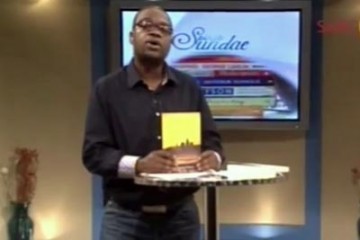
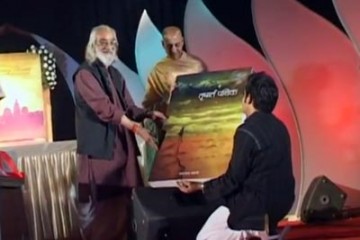
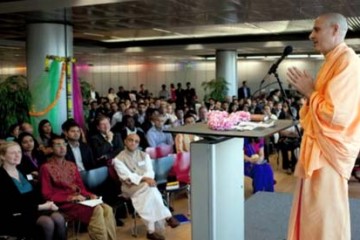
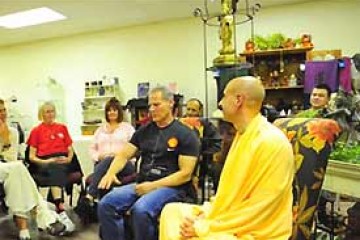
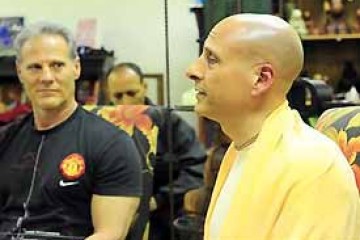
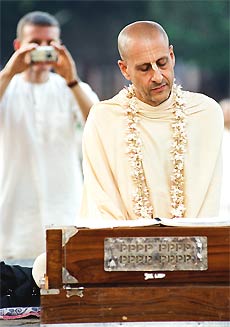

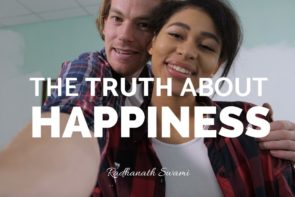



the story of Kailash baba makes a lot of sense. actually communication is beyond words. it is said that 93% of communication happens with the body language and only 7% is through words.
True
Wonderful experience shared by Radhanath Swami.
HH Radhanath Swami’s spiritual odyssey is not only adventurous, but very inspiring as well.
wonderful realization. Thank you maharaj.
Really Wonderful and inspiring expeiences..
As said their are lots of obstacles in the path of Bhakti, but more challenges u face, more determined you become for the lovevof Krishna
Such an inspiring narration! I have read the book “The Journey Home” and is one of the most wonderful books I have every read in my whole life. Radhanath Swami underwent through so many life and death situations to be what he is today – one of the best spiritual masers and speakers in the world, transforming the hearts of millions all over the globe. Hats off to Radhanath Swami. We should be eternally grateful to the Sardar who allowed him entry to our country and Radhanath Swami has kept his word of doing something for the people of India. He has done much much more than that and we are all happy that we have the opportunity of having his association and litening to his lectures. Thank you very much.
Wonderful lecture by HH Radhanath Swami Maharaj.
I felt as if I am hearing the journey home book from the author himself. It amazing to hear directly. the stories are very interesting and he puts up lessons learnt in a simple way.
I also liked the links which are given in the article, they are very helpful
How wonderful, Radhanath Maharaj’s life experiences are extraordinary
Thank you very much for such a nice lecture.